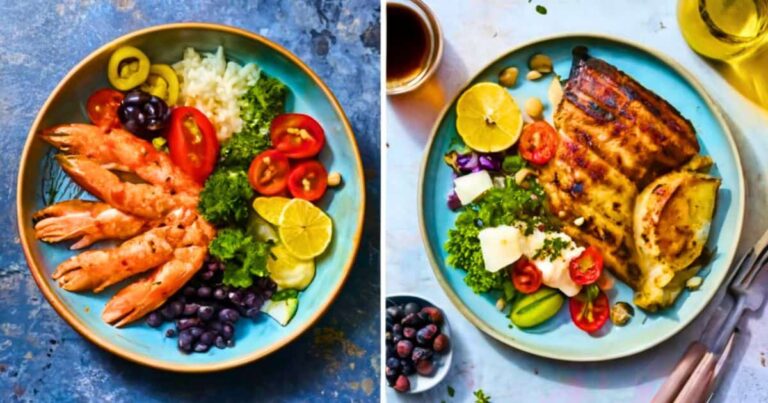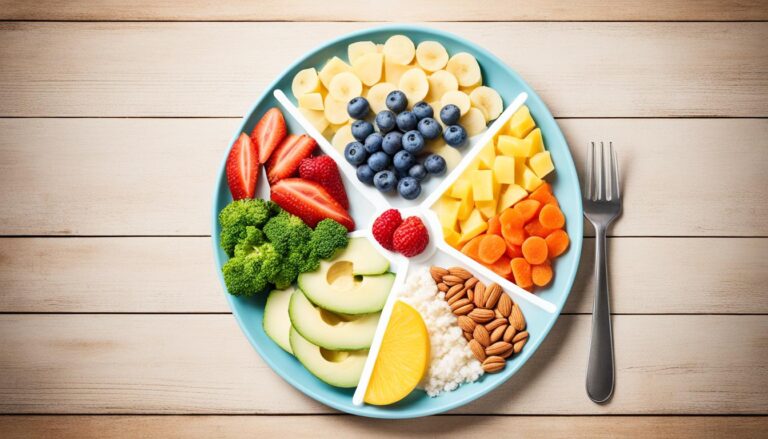Ready to kick your diet up a notch for the best health possible? Get ready for the wonders of superfoods!
They include things like fatty fish full of omega-3s leafy greens, and berries. These superfoods are rich in vitamins minerals and plant nutrients that can boost your health . Adding these nutrient dense foods to your daily meals will power up your body. You’ll get more energy a stronger immune system and just feel better overall.
Key Takeaways
- Nutrient-dense whole foods like oily fish, leafy greens, and berries offer a wealth of essential vitamins, minerals, and antioxidants.
- Plant-based diets emphasizing lean protein sources, whole grains, and cruciferous vegetables can promote physical and mental health.
- Nuts, seeds, and avocados are nutritional powerhouses that support cardiovascular, cognitive, and skin health.
- Occasional indulgence in dark chocolate and fermented foods like pickled veggies can offer unexpected health benefits.
- Incorporating a diverse array of these nutrient-dense foods into your daily routine can transform your overall well-being.
Introduction to Nutrient Dense Foods
A balanced nutrient-dense diet is key for your health. This diet focuses on whole, minimally processed foods. You need things like fruits, vegetables, lean proteins, and whole grains. They give your body vital vitamins, minerals, and more. These foods offer lasting energy and help your immune system heart, and keep diseases awa.
By adding a variety of these superfoods to your meals, you help your body in many ways. It’s the secret to a complete healthy life.
Importance of including a variety of whole nutritious foods in your diet
Interest in nutrient density is rising globally, a jump of about 45% in recent years . But, a 2019 consumer study of 1,000 U.S. adults shows that many know what it is but can’t explain it so others understand. The 2015-2020 Dietary Guidelines for Americans highlight nutrient density. They say nutrient-dense foods are rich in vitamins and minerals but not in bad things like sugar or fat .
Eating many whole, plant-based foods ensures you get all the nutrients you need. From the antioxidant rich berries to healthy whole grains, these foods boost your health in various ways.

Nutrient density is about the best nutrition without too many calories. Focus on whole, less processed foods to get the vitamins and minerals you need. Steer clear of the extra sugars, sodium, and fats found in processed foods.
Taking on a clean eating lifestyle with nutrient dense whole foods is the start of a good diet. There are lots of tasty, healthy foods to try. Nourishing your body with these nutrients is easier and more enjoyable than evern.
Oily Fish Rich in Omega-3s
Oily fish, like salmon and mackerel, are rich in omega-3. These healthy fats are good for your heart and help your brain work better. Eating fish a few times a week helps lower bad fats in your blood and keeps heart diseases away. It also makes you think clearer.
Mackerel has a lot of DHA and EPA, important types of omega-3 fats, per serving. Farmed salmon has even more, and wild salmon is also a great choice. Sardines give you a good amount too.
Missing out on omega-3 may raise the chances of mental health problems4. The brain needs these fats to work well. Eating enough fish can protect your brain and keep you sharp.
The body can change ALA into DHA and EPA, but not very well. You really need to eat fish to get the best omega-3 benefits.

If you don’t eat fish, flaxseeds, chia seeds, and walnuts are good too. They are full of ALA. Flaxseeds have the most, followed by chia seeds and then walnuts. Just remember, fish is still the best source of omega-3.
Adding fish to your diet a few times a week is great for your health. Salmon, mackerel, sardines, and herring are all excellent choices. They help you live a healthier and more balanced life.
| Seafood | EPA + DHA mg per serving |
|---|---|
| Mackerel | 4,580 |
| Salmon | 2,150 |
| Cod Liver Oil | 2,438 |
| Herring | 2,150 |
| Oysters | 329 |
| Sardines | 1,463 |
| Anchovies | 411 |
| Caviar | 1,046 |
This table shows how much omega-3 is in different seafood. It tells us about the good fats in mackerel and salmon, as well as the ALA found in seeds and nuts. Including these foods in your meals makes for a heart healthy diet.
Leafy Greens Packed with Vitamins and Antioxidants
Spinach, kale, and broccoli are full of good stuff. They are rich in vitamins and antioxidants. These help keep us healthy. Eating more of these greens can make a big difference to how you feel.
Benefits of Leafy Greens
Leafy greens are super healthy. For example, a cup of raw kale has a lot of vitamin K. It also has vitamins A and C. Collard greens are also great, especially for vitamin K. And spinach offers lots of vitamin K, A, and manganese in a small serving.
The antioxidants in leafy greens are important for our health. For example, beet greens and watercress are packed with vitamins. They help protect us from diseases like cancer and heart problems6. Including these foods in our meals is a smart move for our well-being.
Leafy greens are not just about vitamins and minerals. They have lutein and zeaxanthin too. These help with eye health. You can easily add these veggies to your meals. Try them in salads, stir-fries, or drink them in smoothies to get all their benefits.
Leafy greens are one of the most nutrient-dense foods on the planet. Consistently eating them can have a profound impact on your health.
Top 15 Types of Healthy Foods
Eating a varied, nutrient-packed diet is key for staying healthy and fit. The top 15 healthy foods are whole, not overly processed. They are full of vitamins, minerals, fiber, and antioxidants. These nutrients boost your energy, lower the chance of getting sick, and help you live a longer life.
Start adding foods like oily fish with omega-3, berries bursting with antioxidants, and leafy greens to your meals. Doing this can really make a positive difference in how you feel and your health.
- Lupin beans: They help keep blood sugar and blood pressure in check. Plus, they are packed with important minerals and fiber.
- Red onions: These are loaded with vitamins C, K, and B12. Their antioxidants are great for your heart and help fight off allergies.
- Sardines: A top choice for omega-3 and vitamin D. These are crucial for a healthy heart and keeping diseases away.
- Capers: Jam-packed with polyphenols and antioxidants. They help slow down aging and keep your skin glowing.
- Watercress: It’s rich in vitamin C, iron, and minerals like calcium and phosphorus. It’s known for aiding in digestion and detoxification.
- Sweet potatoes: They’re a goldmine of antioxidants, flavonoids, and vitamins A and C. These nutrients help fight aging.
- Kale: A nutritional powerhouse with flavonoids, abundant vitamins, and minerals. It’s great for your health in many ways.
- Mushrooms: They offer antioxidants, fight inflammation, and support your immune system. Plus, they’re low in calories.
- Millet: This grain is gluten-free and rich in protein, amino acids, and essential minerals. It’s good for your hair and skin.
- Arugula: It’s a rich source of vitamins and minerals while being low in calories. It’s also known to lower blood pressure.
- Chickpeas: They’re high in fiber, vitamins C, E, and A, magnesium, and protein. They help in controlling blood sugar and support the gut.
- Mangoes: Full of anti-inflammatory benefits, antioxidants, and effects that fight diabetes. They’re a great choice among tropical fruits.
- Lentils: A protein source with potassium, folate, and antioxidants. They help prevent chronic diseases.
- Brussels sprouts: They provide vitamins C and A, potassium, calcium, and necessary protein. They have various health benefits.
- Blueberries: They’re rich in antioxidants like anthocyanins, which lower the risk of heart disease and type 2 diabetes.
Enhancing your meals with these superfoods improves your health and life. By making these foods central to your diet, you fill your body with vital vitamins, minerals, and antioxidants. They help keep you energetic, lower disease risks, and support a long life.

Eating a variety of nutrient-dense foods is the key to a balanced, healthy diet. These top 15 superfoods offer an abundance of essential nutrients that can transform your health from the inside out. Nutrition Expert, Jane Doe
Nuts and Seeds Nutritional Powerhouses
Nuts and seeds are packed with healthy fats, protein, and fiber. They also offer a wide range of vitamins and minerals. Almonds, walnuts, and chia seeds stand out with their unique benefits. Almonds help protect the eyes, walnuts boost heart and brain health, and chia seeds are a great source of fiber and plant protein.
Almonds Walnuts and Chia Seeds Unlocking Nature’s Bounty
Almonds are rich in vitamin E which is good for the eyes. This helps ward off macular degeneration and cataracts. Walnuts are packed with omega-3s, known for fighting inflammation. They promote a healthy heart and brain. Chia seeds offer fiber, antioxidants, and plant protein. They are a great addition to your diet because of their nutritious profile.
Add these superfoods to your meals to improve your overall diet. A daily handful can boost your nutrition level and help you lead a healthier life.
| Nut/Seed | Calories | Fat g | Protein g | Carbs g | Fiber g | Notable Nutrients |
|---|---|---|---|---|---|---|
| Almonds | 170 | 15 | 6 | 6 | 3 | Vitamin E 45% DV, Magnesium 19% DV Manganese 27% DV |
| Walnuts | 185 | 18.5 | 4 | 4 | 2 | Copper 50% DV, Manganese 42% DV |
| Chia Seeds | 138 | 9 | 4.7 | 12 | 10.6 | Fiber, Antioxidants, Plant-based Protein |
Nuts and seeds are full of healthy nutrients, including healthy fats and various vitamins. Adding them to your diet can do wonders for your health. They help your heart, brain, and make you feel full and happy.
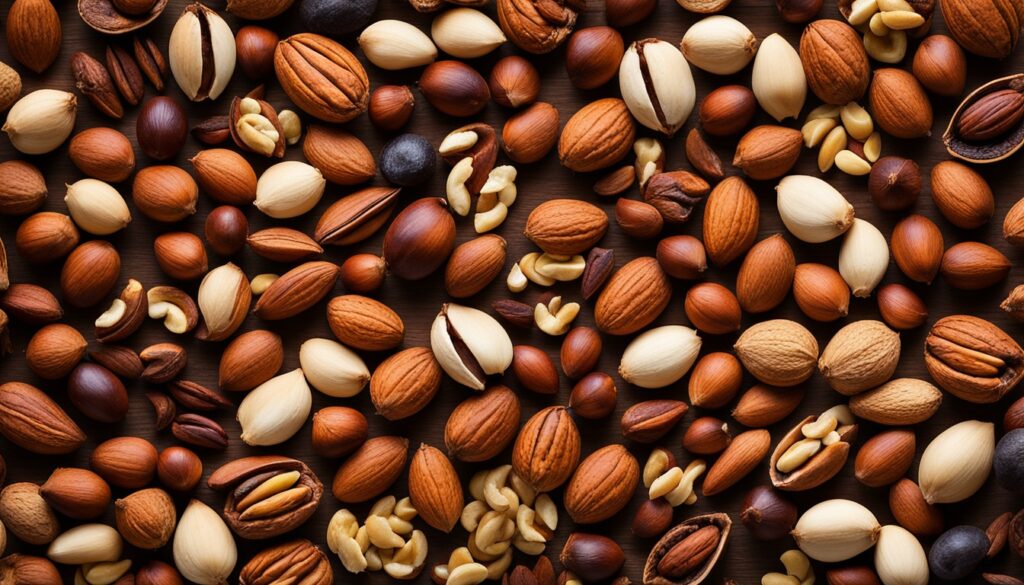
Nuts and seeds are a convenient and delicious way to boost your nutrient intake and support a balanced, healthy lifestyle.
Whether you love almonds, walnuts, or chia seeds, they’re great for any meal. Try them in different ways with your food. You’ll experience many benefits for your health.
Fruits and Berries Nature’s Sweet Treats
Fruits and berries are nature’s candy. They’re full of antioxidants and fiber. These plants help your immune system, heart, and may prevent diseases. Enjoy fruits like papayas and blueberries. They are rich in vitamins and good for your brain.
Watermelon is mostly water, making it great for staying hydrated. It also has potassium and magnesium. Apples are fantastic for your heart. Pears pack vitamin C and fiber. And mangoes bring a burst of goodness with vitamin C and beta-carotene.
Berries are a powerhouse of antioxidants. They fight harmful free radicals. Blueberries stand out, offering fiber and key nutrients. Eating them might make your heart healthier.
| Fruit/Berry | Nutritional Benefits |
|---|---|
| Papaya | Rich in vitamins A, C, and E, as well as fiber. |
| Apricots | Contain lutein, vitamin E, and beta-carotene, beneficial for vision health. |
| Watermelon | Consists of 92% water, providing hydration and essential minerals like potassium and magnesium. |
| Apples | Contain phenolic compounds that can reduce total cholesterol, lowering the risk of heart disease. |
| Pears | Offer vitamin C, fiber, and hydration benefits. |
| Mangoes | A good source of vitamin C, potassium, and beta-carotene. |
| Kiwis | Contain folate, magnesium, and B vitamins that may aid in relaxation and better sleep. |
| Bananas | Contain prebiotic fiber and potassium, supporting gut and heart health. |
| Oranges | Rich in vitamin C with anti-inflammatory and antioxidant properties. |
| Cherries | May help reduce stress and promote calmness due to antioxidant benefits. |
| Grapes | Have antioxidant compounds, potentially reducing cellular damage. |
| Guava | Provides vitamin C, potassium, and fiber, beneficial for the immune system. |
| Strawberries | High in antioxidants and vitamin C. |
| Blueberries | High in antioxidants and vitamin C. One cup provides four grams of fiber and essential nutrients. |
| Raspberries | High in fiber and antioxidants, helping stabilize blood sugar levels. |
| Pomegranate | Contains fiber, potassium, vitamin C, and vitamin K, offering multiple health benefits. |
| Pineapple | Contains bromelain, aiding in reducing inflammation and digestion, along with vitamin C and manganese, beneficial for brain and nervous system function. |
Eating a lot of colorful fruits and berries is tasty. It also boosts your antioxidant and fiber intake. Enjoy watermelon, mango, or raspberries. They are healthy and amazing treats for your body.
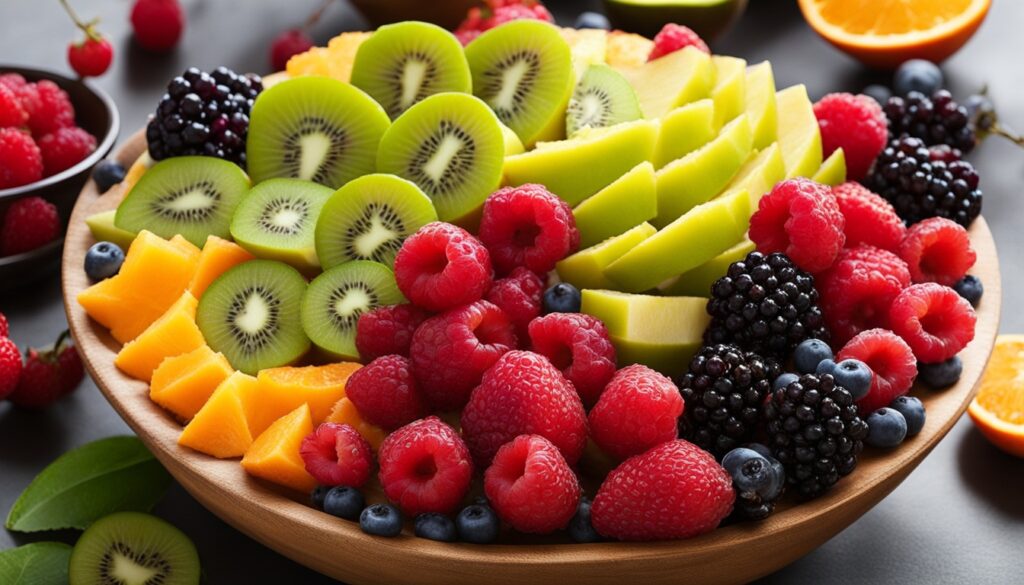
Lean Protein Sources Eggs Chicken and Legumes
It’s key to eat lots of lean protein sources. They help build and keep your muscles. They also help with managing weight and staying healthy. Foods like eggs, chicken, and legumes are full of protein. They make you feel energetic and full all day long.
Incorporating Lean Protein into Your Diet
Eggs are a cost effective way to get high-quality protein. Each egg white has 3.6 grams of protein. They also offer vital nutrients like B vitamins, choline, and lutein. Chicken breast is lean too, low in fat and rich in muscle building amino acids. Each 3.5 ounces has about 30 grams of protein.
Beans and peas, known as legumes, are a great plant-based choice. They’re packed with fiber, complex carbs, and antioxidants. Plus, they have 20-25 grams of protein in every half-cup after cooking.
The Dietary Guidelines for Americans suggest getting about 5.5 ounces of protein daily. This is based on a 2,000 calorie diet. A good mix of protein sources each day can help you meet this goal. It also keeps you satisfied and supports your health and fitness.
| Protein Source | Serving Size | Protein g | Calories | Saturated Fat g | Total Fat g |
|---|---|---|---|---|---|
| Chicken Breast Skinless, Small | 3.5 oz 100g | 36.0 | 160 | 1.0 | 2.5 |
| Lean Beef | 3.5 oz 100g | 22.3 | 164 | 3.1 | 7.6 |
| Chickpeas | 1/2 cup 82g | 7.3 | 134.5 | 0.2 | 2.1 |
| Low-fat Greek Yogurt | 7 oz 200g | 19.9 | 146 | 2.5 | 3.8 |
| Egg Whites | 1 egg white | 3.6 | 34.4 | 0.0 | 0.0 |
The table above shows how much protein and what nutrients different foods have. It helps you make smart choices for your fitness and weight goals.
A balanced diet rich in lean protein, along with nutrient-dense fruits, vegetables, and whole grains, can help you feel energized, build and maintain muscle, and achieve a healthy weight.- Registered Dietitian, Jane Doe
Adding eggs, chicken, and legumes to your meals helps your body get the nutrients it needs. This approach can support any fitness goal. Whether you aim to build muscle, keep your weight in check, or stay healthy, a variety of proteins is key.
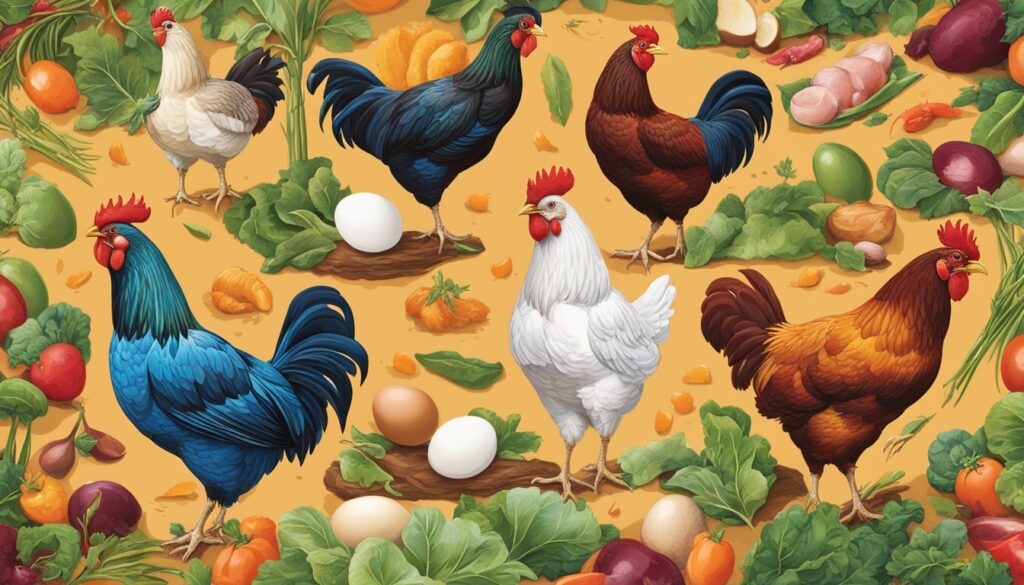
Whole Grains Complex Carbs for Energy
Whole grains are top picks for carbs. Unlike white versions, they keep the good parts like bran and germ. This means they’re rich in complex carbs, fiber, and many vitamins and minerals. Eating whole grains can lower heart disease, type 2 diabetes, and some cancers.
These grains give you a slow release of energy thanks to their complex carbs. A cup of quinoa cooked has 39.4 grams of carbs. And oats, a cup uncooked, has 103 grams. This steady energy can help you stay full longer and manage your weight better.
It’s easy to add whole grains to your meals. Swap refined grains for whole grains in foods like oatmeal, rice stir-fry, and quinoa salads. These foods are packed with nutrients and help keep your blood sugar stable.
| Food | Carbohydrates per serving |
|---|---|
| Quinoa 1 cup, cooked | 39.4 g |
| Brown Rice 1 cup, cooked | 45.8 g |
| Oats 1 cup, uncooked | 103 g |
| Whole-Wheat Bread 1 slice | 14 g |
| Whole Wheat Pasta 1.2 cup, dry | 43 g |
Eating a variety of whole grains is an easy way to get more complex carbs, fiber, and nutrients. Start your day with oatmeal, have a whole grain sandwich for lunch, or enjoy quinoa at dinner. These grains keep you energized all day.
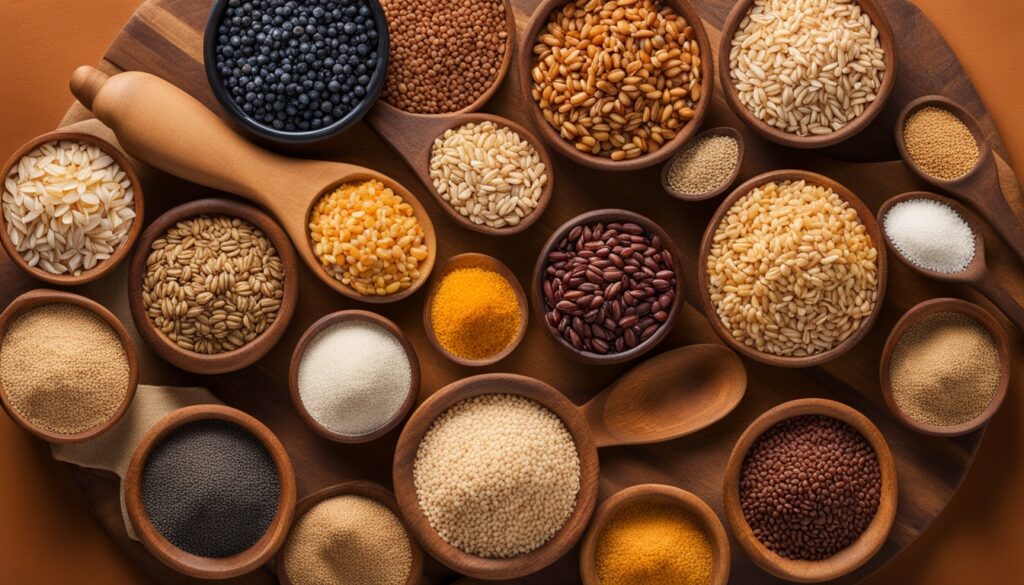
Whole grains are a nutritional powerhouse, providing a wealth of complex carbs, fiber, and other vital nutrients that can support overall health and well-being.
Cruciferous Vegetables Cancer Fighting Properties
Cruciferous vegetables, like broccoli, cauliflower, and cabbage, are packed with health benefits. They contain glucosinolates, which help your body detox and guard against cancer. Broccoli is especially great because of the antioxidant sulforaphane. This can help fight inflammation and cancer. Cauliflower and cabbage are also full of vitamins, minerals, and fiber, improving your health.
Research suggests eating more of these veggies could lower cancer risks. In studies, people who ate lots of cruciferous vegetables were less likely to get prostate cancer. Also, women eating a lot of these veggies were at a lower risk for colon cancer. For lung cancer, a different study showed that women who ate over 5 servings a week lowered their risk.
Beside cancer, these vegetables can help in other ways too. Indole-3-carbinol, found in cruciferous veggies, helped slow down abnormal cervical cell growth better than a placebo. Some studies show that our genes might affect how well these veggies protect us from lung and colorectal cancer.
Adding these vegetables to your meals can boost your health. Try them in salads, roasted dishes, or stir-fries for a nutritious diet. The Dietary Guidelines suggest eating lots of vegetables to stay healthy and lower your risk of illnesses, such as cancer.
Cruciferous vegetables like broccoli, cauliflower, and cabbage are nutritional powerhouses that offer an array of health benefits.
Superfoods Avocados Sweet Potatoes and More
There are so-called superfoods that offer more nutrients than the usual whole foods. Avocados are a great example. They’re full of good-for-you fats for your heart, fiber, and lots of vitamins and minerals. Contrastingly, sweet potatoes give you beta carotene and vitamin C. They also have complex carbs that keep you energized long-term.
Chia seeds, quinoa, and blueberries are also superfoods. They provide many plant compounds, antioxidants, and important nutrients. Adding these foods to your diet can improve your health and wellness.
- Chia seeds have omega-3s and antioxidants. Plus, they might help fight cancer.
- Quinoa is a complete protein, meaning it has all essential amino acids. It’s also high in fiber, and minerals like iron and zinc.
- Blueberries are high in antioxidants. They protect against cell damage, lowering cancer and heart disease risks.
| Superfood | Nutritional Benefits |
|---|---|
| Avocados | They’re rich in healthy fats and antioxidants. They support cholesterol, bone health, skin, and eyes. |
| Sweet Potatoes | They’re packed with beta-carotene, vitamin C, and offer long-lasting energy. They also have many health-boosting properties. |
| Berries | They contain flavonoids that reduce heart attack risk and fight diseases. |
Using these superfoods can truly improve your diet. They offer essential fats, antioxidants, and various nutrients that support your health. These foods can make a big difference in how you feel and function every day.
Superfoods like avocados, sweet potatoes, and blueberries are nutritional powerhouses that can elevate your health and vitality when added to a balanced diet.
Conclusion
Eating a rich variety of whole foods is essential for a balanced diet and good health. Include oily fish for omega-3, leafy greens for antioxidants, and legumes for fiber. You should also enjoy whole grains for complex carbs.
These foods provide vitamins, minerals, and plant compounds. These boost your immunity, help your heart, and fight illnesses. They also play a key role in managing your weight.
Introduce superfoods into your daily meals to experience nature’s goodness. Eating clean with these foods will make you feel great and full of life. It’s a path towards lifelong optimal health.
Why wait any longer? Dive into the world of whole foods now. Let these natural ingredients help you be healthier and happier.

